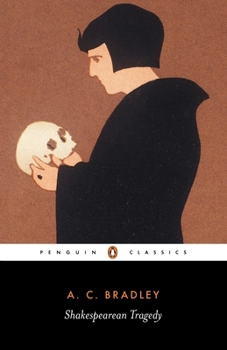Shakespearean Tragedy: Lectures on Hamlet, Othello, King Lear, and Macbeth
Select Format
Select Condition 
Book Overview
"A.C. Bradley put Shakespeare on the map for generations of readers and students for whom the plays might not otherwise have become 'real' at all" writes John Bayley in his foreword to this edition of Shakespearean Tragedy: Lectures on Hamlet, Othello, King Lear and Macbeth. Approaching the tragedies as drama, wondering about their characters as he might have wondered about people in novels or in life, Bradley is one of the most liberating in the line of distinguished Shakespeare critics. His acute yet undogmatic and almost conversational critical method has--despite fluctuations in fashion--remained enduringly popular and influential. For, as John Bayley observes, these lectures give us a true and exhilarating sense of "the tragedies joining up with life, with all our lives; leading us into a perspective of possibilities that stretch forward and back in time, and in our total awareness of things." For more than seventy years, Penguin has been the leading publisher of classic literature in the English-speaking world. With more than 1,700 titles, Penguin Classics represents a global bookshelf of the best works throughout history and across genres and disciplines. Readers trust the series to provide authoritative texts enhanced by introductions and notes by distinguished scholars and contemporary authors, as well as up-to-date translations by award-winning translators.
Format:Paperback
Language:English
ISBN:0140530193
ISBN13:9780140530193
Release Date:October 1991
Publisher:Penguin Group
Length:480 Pages
Weight:0.72 lbs.
Dimensions:0.8" x 5.0" x 7.8"
Age Range:18 years and up
Grade Range:Postsecondary and higher
Customer Reviews
4 ratings
Literary criticism which is in and by itself great literature
Published by Thriftbooks.com User , 18 years ago
In his opening chapter Bradley defines for us the essence of Shakespearean tragedy. He points out that Tragedy involves the fall of a great hero, but that this fall does not come as random event or as willful act of God , but rather through the results and consequences of the action of the hero himself. He points out too that the effect of this fall is not to leave us in despair or depression, but rather to leave us with a sense of the wonder, mystery and greatness of life i.e. that paradoxically Shakespearean tragedy has an effect on its audience which is uplifting. And this though the hero invariably is killed at the end. Bradley points out also that the death in tragedy is not the slow crawling death of an illness, but comes out of a sudden violent effect of the action. This too sharpens our sense of wonder and mystery. The heroes of tragedy and their stories somehow give us a feeling of life and its terrible end which magnifies our feeling of 'greatness' while somehow leaving us more humbled. I do not know if the paragraphs written above translate Bradley in a completely accurate way. I do know his writing is inspirational, moving and uplifting. The criticism of the plays makes you want to know and read the plays more. This is the kind of Literary criticism which is great literature in and by itself.
Speaking to 21st century readers....
Published by Thriftbooks.com User , 22 years ago
A.C. Bradley wrote these lectures in 1904, and the book has gone through at least 26 printings. It is significant that the Folger Shakespeare Library has republished these lectures. They are hugely important and vibrantly written. I am sure my father read these in college, and I know my son did, too. I'm glad I finally got around to them! You will be, also, for all the reasons that other reviewers have noted.
A wonderful writer on a great subject
Published by Thriftbooks.com User , 25 years ago
I am so glad this book is still in print (it was first published in 1904, I think). My original copy was second-hand and it would be awful to think I couldn't get another! Bradley is so illuminating on Shakespeare's intentions, and on the characters of his great tragic figures. If nothing else, read his brilliant discussion of Macbeth - it will convince you that, for a perspective on human nature, for conceiving a dramatic character whole, Bradley was as great a critic as Shakespeare was a playwright. Don't miss him!
Brilliant Shakespearean criticism
Published by Thriftbooks.com User , 25 years ago
Bradley offers some of the most eloquent, complete, and balanced criticisms of the tragedies that I have yet read. Unlike so many literary critics of today, Bradley does not disdain to view Shakespeare's characters as actual people, which lends his view of the works a sense of import and meaning which so few critics manage to convey. These lectures are necessary reading for anyone at all who wishes to understand Shakespeare's tragedies better, actors, directors, and academics alike.





